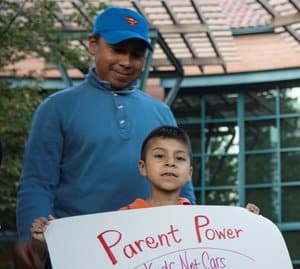Introduction
Site Content/Navigation
1.Parent Power
What are the values, strategies and parent roles underpinning parent power?
2.Measurement 101
What are inputs, outputs, outcomes and infrastructure? How do you set targets and link work to student success?
3.Measurement by Strategy
How does measurement work in executing each parent power strategy?
4.Measurement by Action
How does measurement work for house meetings, canvassing and other actions?

* We are using ‘parent’ as short-hand for any family or community member taking responsibility for the education and future of a child
Education systems should provide ALL children the full opportunity to pursue their best destinies.
Realizing this vision requires informing and organizing parents* so that they can exercise their innate power – individually and collectively – to create and sustain such systems.
A growing community of organizations are dedicated to parent power in education. As these efforts scale, they inevitably have to explore how to best use measurement to maximize their impact.
This web-based resource is designed to serve social entrepreneurs and philanthropists in their journey on parent power and measurement by addressing the following questions.
- How do social entrepreneurs develop more clarity on when and how to use measurement to unlock value in planning, executing and learning from campaigns, and in attracting allies and resources?
- How do philanthropists use measurement to better understand their impact, learn alongside their grantees, and ultimately deploy more funding and structure it to best meet the needs of the field?
Together, strong measurement creates strong social contracts between entrepreneurs and funders collaborating to support parents in driving change.
There is no one recipe for how parent power can drive impact, nor a single formula for how to leverage measurement in this work.
Rather, this website provides a “Pragmatic Playbook” to help individuals and organizations apply these tools within their local context and local campaigns to improve education and harness the value of measurement. Further, your organization should ‘Goldilocks’ what it measures. You should only capture measures that help your organization make better decisions to increase impact (and are practical to collect).
It is also crucial that we remember that measurement is itself an act of power. We measure what we value, and so what we measure reflects our values. If we are imposing measures of success on parents and communities, we are essentially also then imposing our values and agenda on them. As we develop our capacity to use measurement to manage and maximize impact in parent power efforts, it is crucial that parents play a lead role in defining the agenda for change and how they would then measure progress and success in advancing that agenda.
We are sharing this content through a website to ensure it is easily accessible by a broad range of users with different needs, to provide downloadable tools, and to continue to refine and add content to the site. We hope this will be a living and learning resource that will evolve over time based on your use and feedback.
Summary of parent power
Parent power works by informing and organizing parents so that they can exercise their innate power – individually and collectively – across four strategies. Below is an interactive graphic that provides examples of practitioners leading various efforts in this space. And for more details, click here.
When successful, parent power efforts are transforming the education and lives of children.
- There are organizations who are increasing academic success by supporting parents in exercising their power as education partners.
- Other organizations are enabling parents to choose the schools (and make choices at those schools) that they believe are the best fit for their children.
- Yet others are helping parents exercise their collective voice in issue campaigns to change policies that influence a wide range of education practices, determine how precious resources of time, talent and money are deployed in schools, and even enable new schools to open.
- And finally, some organizations are helping parents exercise the electoral power of their vote to ensure that those in positions of authority reflect the priorities of parents.
Partners
We would like to express deep gratitude to the following organizations for their passionate commitment to this work, indispensable partnership, and willingness to share their time, wisdom and resources:

225 Franklin Street, Suite 350
Boston, MA 02110
617.912.8800
This work is licensed under a Creative Commons Attribution-NonCommercial-ShareAlike 2.0 License (CC BY-NC-SA 2.0)
Click Here to learn more.


















